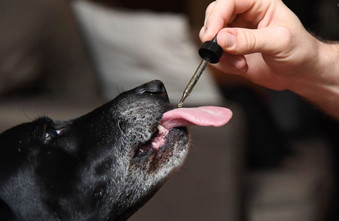Cannabis products for pets are rapidly growing in popularity across the world. It’s no surprise since most owners will do anything for their furry friends. But how much evidence is there that CBD for pets actually works, and is it okay to give CBD to a pet without a prescription from a vet?
What are CBD pet products?
Cannabis pet products are products that include cannabidiol (CBD) or other cannabinoids and
are intended for consumption by dogs, cats, horses, and other animals. These
can include dog treats, cat treats, soft chews, capsules, topical products, and
of course, CBD oil.
Humans have been taking cannabis as medicine for thousands of years. Ancient
beliefs about the medicinal value of
the plant have been confirmed by studies, and we now know that the endocannabinoid system
(ECS) plays a crucial role in overall health. Evidence has
confirmed the existence of the ECS in all mammals, which includes pets.
The endocannabinoid system in pets
Just as cannabinoids like CBD and THC can activate the human endocannabinoid
system, they can activate the ECS in your cat or dog, too. A balanced ECS in pets
promotes homeostasis and can help regulate appetite, sleep, mood regulation and
stability, gait, pain perception, memory, body temperature, immunity,
reproduction, and fertility.
The ECS works a bit like a dimmer switch, turning up or down cellular activity
in order to maintain balance or homeostasis. Certain endocannabinoids also have
mood-boosting and anti-inflammatory effects.
Can pets have THC?
Contrary to popular belief, THC isn’t highly toxic to dogs or cats – but it
isn’t good for them, and can have serious negative effects.
Pets, particularly dogs, are more sensitive to the effects of THC, and even
small doses (relative to their body size) can have powerful effects.
Dogs have a high concentration of cannabinoid receptors in the cerebellum, a
part of the brain responsible for balance and coordination. Ingesting THC can
cause a unique neurological reaction called “static ataxia,” a loss of balance
that may lead to repeated stumbling and rocking back and forth, acting as if
they cannot move. So when it comes to cannabis for pets, stick with CBD
products that have minimal amounts of THC (less than 0.3%) or none at all.
CBD in pet products
CBD (cannabidiol) is the main cannabinoid used in pet products, although it’s
not unusual to see other minor cannabinoids like CBG and CBN as well. CBD is well
tolerated in humans because it isn’t intoxicating and has relatively few side
effects – and the same seems to be true for cats and dogs. Most animal studies
on CBD have been in rodents, but there are a few studies with cats and dogs
from which we can draw conclusions.
In addition to the limited, albeit growing body of scientific research, the
internet abounds with anecdotal reports of animal owners saying they have
successfully treated their pets with cannabidiol.
The benefits of CBD for pets
CBD’s documented effects in humans carry over to this compound’s effects in
your furry friends. CBD is thought to strengthen anandamide signaling by
blocking FAAH, the enzyme responsible for its degradation.
Other effects of CBD include:
- Analgesic – CBD’s ability to reduce pain is well-documented in studies on dogs with arthritis. CBD can be helpful for older pets or pets recovering from injuries.
- Anti-inflammatory – CBD has been found to reduce inflammation by suppressing the immune system and binding with TRPV1 vanilloid receptors, which can help older animals move around more easily, with less pain.
- Anti-anxiety – CBD activates the 5HT1A serotonin receptors bringing about a calming effect, which can help anxious animals.
- Reduces seizures – one of the most well-documented CBD therapeutic effects also benefits pets. If your pet is prone to seizures, talk to your vet about a CBD regimen.
- Anti-tumoral – CBD has been found to reduce tumor size and prevent the spread of cancer cells in some cancers in preclinical studies.
How to dose CBD for pets
There is no “one standard dose” for giving your dog or cat (or horse) CBD. Pets
come in all shapes and sizes with unique endocannabinoid systems, so it may
take some trial and error to find the right dose for your pet.
Start with a low dose and gauge your pet’s reaction. The typical recommended
dose for CBD in pets for CBD dosing is 0.25 – 2 mg per kg of body weight, once
or twice daily. Pick a low dose and give it consistently for 7 – 14 days.
Watch your pet, and if you’re not seeing improvements in their movement (or any
other desired effect), slowly increase the dose.
Can your pet overdose on CBD?
Yes. Your pet can have too much, and while overdosing on CBD isn’t fatal, side
effects of having too much CBD include vomiting which won’t be fun for you or
your pet.
In the United States, there is a well-developed CBD pet product market where a
number of specially formulated pet CBD products are available such as edibles
(chews, treats, and biscuits) and capsules or oils for
dogs and cats. Soggy Bottom Hemp makes and sells unflavored and unscented oils for both cats and dogs, as well as bacon flavored dog treats in sizes for small and large animals.

